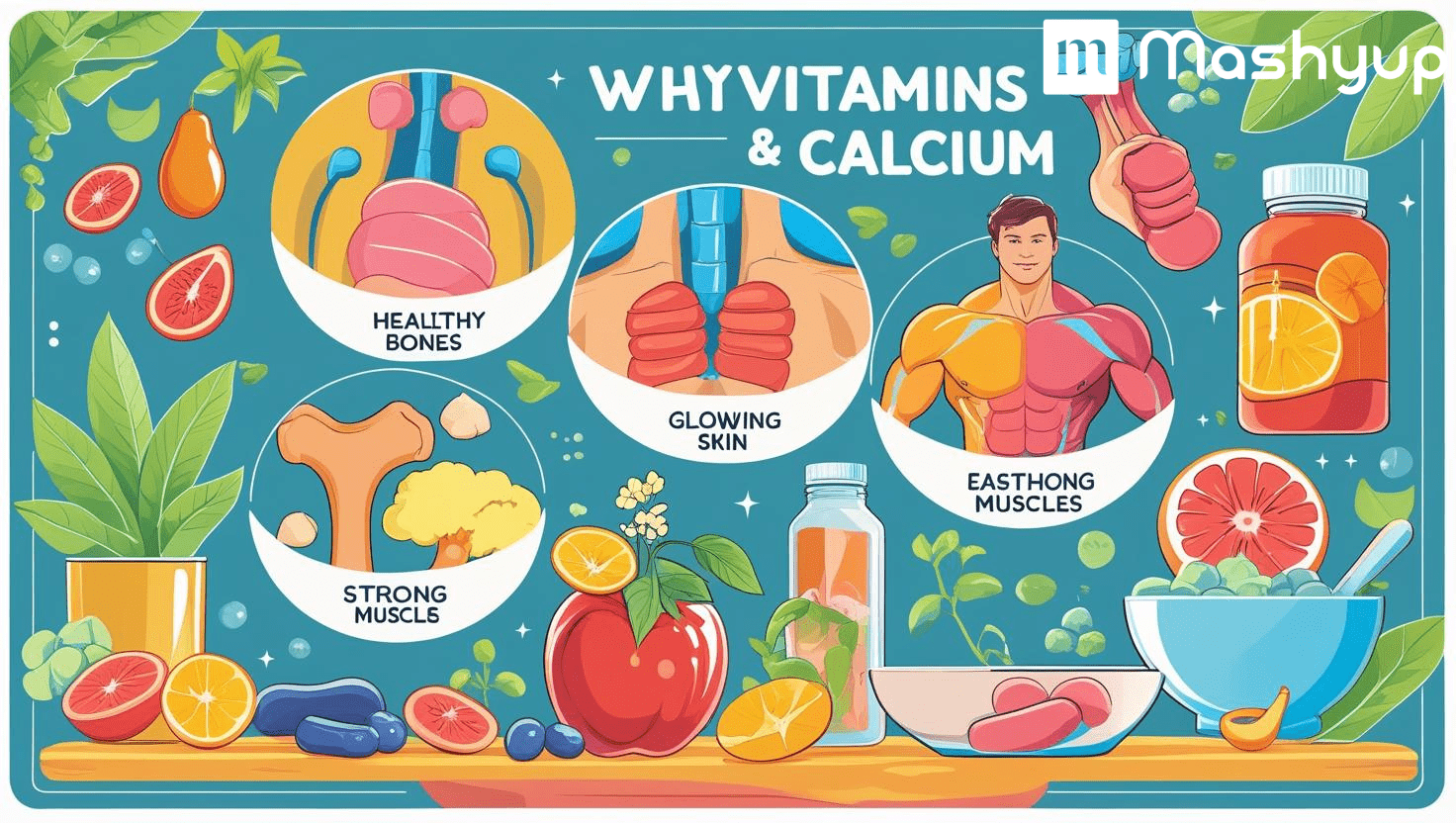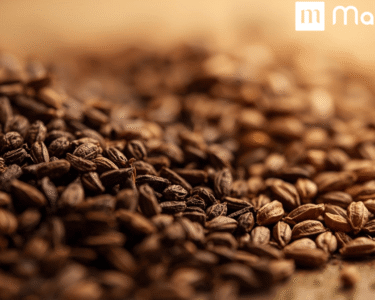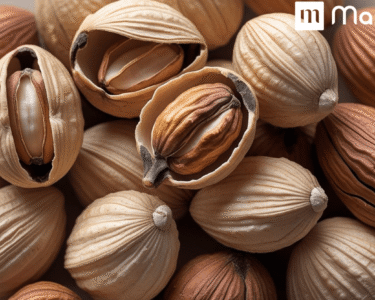Ever ponder why your mother, your doctor, and even your dietician are always emphasizing the need of vitamins and calcium in your daily diet? These nutrients are essential components of a healthy lifestyle, so it’s not merely a health craze. Vitamins and calcium are necessary for energy, immunity, bone strength, and general vigor, regardless of age.
Let’s understand their importance in more details.
Understanding What Are Vitamins and Calcium ?
Before we explain why vitamins and calcium are important, let’s find out hat these nutrients actually are:
Calcium : The Bone Builder
We need to understand that calcium is a mineral and not any vitamin. Therefore, it deserves its own spotlight. Bones and teeth is made up of 99% calcium, which makes it extremely important fur building of bones. Further the remaining 1% helps in muscle contraction, nerve transmission and hormone secretion as well.
The Invisible Powerhouse: Vitamins
Vitamins manage all the physiological functions of our body. They are basically the organic compound which body requires in small amounts. Although these vitamins don’t provide energy like carbohydrates or fats, they can definitely help your body. They are further classified into :
- Fat soluble vitamins : This category of vitamins contains Vitamin A, D, E and K
- Water soluble vitamins : This category involves vitamin C and B complex(B1, B2, B6, B12), niacin and folate.
They help in making our body do various functions, including producing red blood cells to maintaining skin health and boosting immunity.
Why are Vitamins and Calcium so Essential for our Body ?
1. Brain and Nervous System Support
Vitamins: Vitamins B12 and B6 are very essential in brain development and maintenance of a good nervous system.
Calcium : Calcium work wonders for our brain, as it helps neurons to transmit signals properly and effectively.
2. Strong Bones and Teeth
Vitamins: Vitamin D helps in the good and complete absorption of all the calcium we give to our body. Without Vitamin D, the calcium we consume won’t do any benefit to our body.
Calcium : Calcium plays the most important role in building bones in our body. They even contribute to maintaining bone density if consumed regularly. Often, we have to struggle with issues like osteoporosis or brittle bone disease, if our body lacks calcium in it.
3. Builds Immunity
Vitamins
Vitamin A : Helps in maintaining good skin health and mucous membranes.
Vitamin D : It helps in reducing inflammation in the body while also modulating the immune responses.
Vitamin C : Boosts the production of white blood cells in the body, which fight infections.
4. Heart Health
Vitamins : Vitamins like B6, B12, and folate help in reducing the risk of any heart disease by lowering the homocysteine level in the blood.
Calcium : You may not know it before, but calcium helps in contraction of the heart muscles which makes it a very important element for the heart to work properly. Also, calcium helps in regulating the blood pressure levels of our body.
5. Energy Production and Fatigue Reduction
Calcium : Keeps your bones stronger and active.
Vitamins: Vitamin B complex helps in conversion of food into energy especially vitamin B1,B2,B3 and B5.
Deficiency of Calcium and Vitamins Effects
It’s important to understand that deficiencies of vitamins and Calcium can lead to serious health issues over a period of time:
| Nutrient | Deficiency Effects |
| Calcium | You get muscle cramps often with poor bone health. Your Nails too become brittle. |
| Vitamin A | Leads to dry skin and in worst cases even night blindness. |
| Vitamin D | Often makes you feel depressed, tired, and have bone pains in different parts of the body. |
| Vitamin B12 | Leads to damage of nerves, memory issues and leaves you feeling fatigued. |
| Vitamin C | The deficiency leads to slow wound healing and bleeding gums. |
| Vitamin K | The deficiency leads to excessive bleeding and poor clotting |
When such vitamin deficiencies are ignored over a long period of time, it can even lead to scurvy, rickets, cardiovascular diseases, weakened immunity, and cognitive decline.
Creative Ways to Include Vitamins and Calcium in Your Diet
For the daily intake of vitamins and calcium, you don’t need fancy supplements or expensive superfoods. Our mother nature has already provided us with all such supplements in numerous variations. Let’s learn about some of these:
Vitamin Rich Foods:
| Vitamins | Food Sources |
| Vitamin A | Spinach, Carrots, sweet potatoes |
| Vitamin B12 | Meat, dairy, fish, eggs |
| Vitamin C | Strawberries, kiwi, bell peppers, oranges |
| Vitamin D | Egg Yolks, Mushrooms, fortified Milk, Sunlight. |
| Vitamin E | Spinach, Seeds, nuts. |
| Vitamin K | Broccoli, Kale, Green leafy vegetables |
| B complex | Legumes, Meats, leady vegetables, whole grain. |
Calcium Rich Foods
- Leafy greens like spinach, kale, broccoli.
- Dairy products like milk, cheese, yogurt.
- Fortified Cereals and orange juice.
- Tofu and soy products
- Fish and soft bones like sardines and salmon
- Almonds and sesame seeds.
Supplements or Food – Which is Better Option ?
Before diving in its details, let’s learn this Golden rule : Food First, supplements second.
Yes, consuming vitamins and calcium in their natural form is always a better option than taking them in supplement form. But yes, there may be some times, when the deficiencies fall too low or under the following conditions :
- During pregnancy or lactation
- Elderly Individuals
- For people with restricted diets like vegans or vegetarians
- People with digestive disorders like celiac or Crohn’s.
Your Health is in Your Hands
We frequently overlook the equally important micronutrients, such as vitamins and minerals, in the rush for calories, fats, and carbohydrates. A diet deficient in calcium and vitamins is just like a smartphone without a battery. Even if it seems good, it just won’t function.
It’s not necessary for a balanced dish to be boring always. You can create a tasty plate that supports strong bones, a sharp memory, radiant skin, and boundless energy with a few simple changes to your regular diet.
Therefore, the next time you prepare your meal, consider the nutrients that are sustaining your life rather than merely taste.






